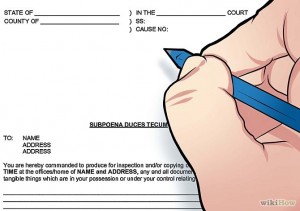 Dealing with subpoenas from the Family Courts is becoming a common occurrence for many professionals. Applications for financial, banking, insurance, superannuation or medical records are common place in the interests of full mutual disclosure by both parties in a relationship breakdown.
Dealing with subpoenas from the Family Courts is becoming a common occurrence for many professionals. Applications for financial, banking, insurance, superannuation or medical records are common place in the interests of full mutual disclosure by both parties in a relationship breakdown.
Most professionals will simply hand over the requested material without any scrutiny of what is contained and in most cases this does not cause issues, however there is material which may be protected and should be objected to, and professionals should closely scrutinise what they are producing.
Failure of a professional to object to a subpoena for their client’s information could expose the professional to a claim of negligence from their client. It is important, therefore, that professionals have an understanding of how subpoenas work, how they must be complied with and how to object to them.
A subpoena is an order issued by the Court to compel a person or business to either produce records, or attend court as a witness, or both. The Court issues a subpoena at the request of one of the parties to the proceedings and the document will be served on the entity the party is seeking information from.
You must comply with a subpoena, unless it was not served on you correctly under the Family Court Rules. The Rules require that the subpoena is served on you by hand, at least 7 days before the court date, and also pay your reasonable expenses (known as “conduct money”) for complying with the subpoena. If you have any concerns about the service of the subpoena you should contact a lawyer to discuss the matter.
There are very serious consequences if you do not comply with the subpoena, including the Court issuing a warrant for your arrest or ordering you to pay any costs caused by your non-compliance. The court may also find you guilty of contempt of court.
If you are a professional who has received a subpoena for your client’s information, the first step is to advise your client and seek their instructions about anything they are concerned being disclosed to the other parties. In addition to this it would be wise to seek the assistance of a lawyer to see if any of the material would fall into a category which could be objected to.
If the subpoena is to give evidence, check the date, time and location that you are required to attend. The party serving the subpoena must also provide you with reasonable conduct money to cover any travel expenses, accommodation, meals etc. If they have not you can contact the party issuing the subpoena and request the conduct money.
If the subpoena is for the production of documents you can either provide the originals or copies of the documents. Read the subpoena carefully, it will tell you when and where to produce the documents. An important point to note is that that the documents get sent to the court, not the other party. Again the party issuing the subpoena should provide you with reasonable conduct money to produce the documents.
If you have concerns about the nature of the material that the other party has requested, because it doesn’t seem relevant, is privileged or somehow else sensitive, then you need to get independent legal advice as soon as possible. There are a number of legal grounds that you can object to the subpoena, but you have to let all parties know with adequate time. Arguing against a subpoena involves complex areas of law, so it is wise to have a lawyer handle this side of things for you.
Normally the court will hold the material produced pending any objections being heard about it being produced to other parties. Once these issues are determined the court will either make material available for viewing, copying, or both, or else strike the subpoena out and have the material returned to you.
Related Family Law Information
No items found in feed URL: http://www.familylawexpress.com.au/family-law-brief/category/evidence/subpoena/feed/. You requested 15 items.
Stay Informed. It’s simple, free & convenient!